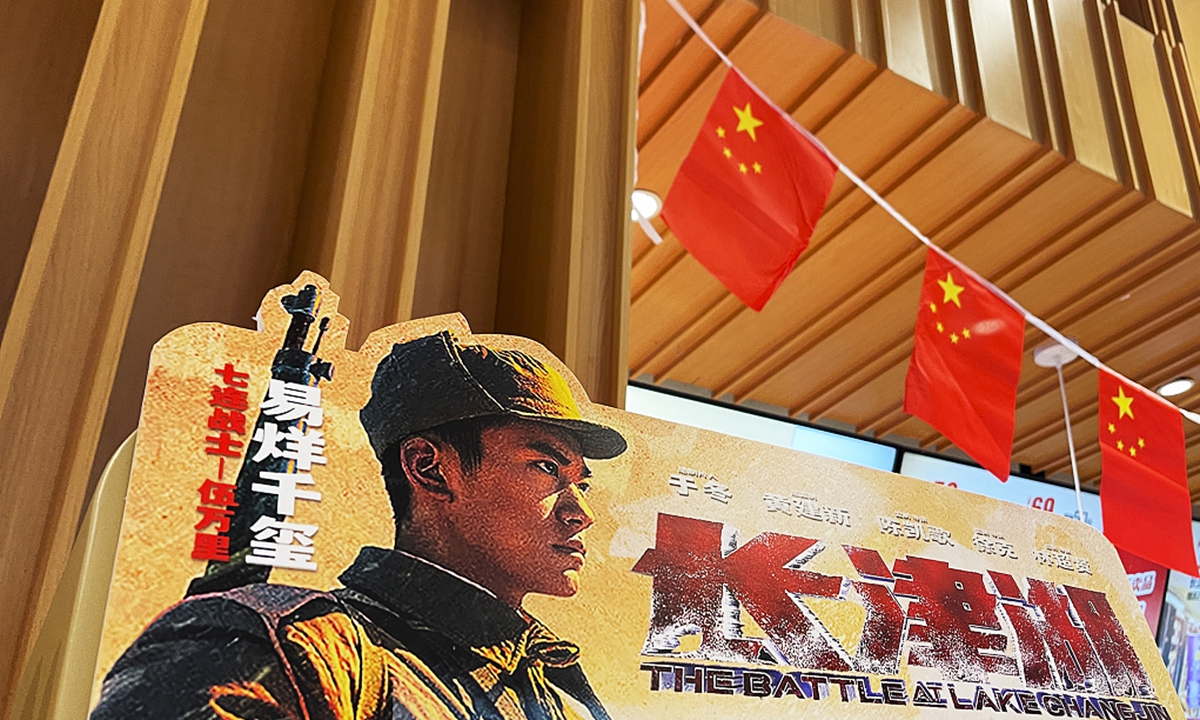The Battle at Lake Changjin, whose box office is expected to be the largest in Chinese film history, has pushed the patriotic sentiment of people across the country to a peak amid the tense China-US competition and China’s effective control of the epidemic, Chinese film observers said.

As of Thursday afternoon, the film had grossed 3.36 billion yuan ($521 million), according to Chinese ticketing platform Maoyan, far more than the hit Hollywood films Venom: Let There Be Carnage and No Time to Die, in the market overseas.
The film tells the story of how Chinese People’s Volunteers (CPVs) soldiers held their ground amid fierce cold and the enemy’s more advanced weapons during the War to Resist US Aggression and Aid Korea (1950-53).
“Based on current box office trends and data, the box office of The Battle at Lake Changjin could eventually exceed 5 billion yuan, and it’s expected to topple the 5.69 billion yuan earned by Wolf Warriors 2,” Shi Wenxue, a film critic based in Beijing, told the Global Times on Thursday, calling it “a war epic that represents the highest level of Chinese film industrialization.”
Eight days after its premiere on Thursday, the war epic has smashed 14 box office records, including the single-day box office record and the cumulative box office record in the National Day holidays as a historical film.
Most moviegoers who watched the film told the Global Times that they were touched by the scenes where Chinese solider Yang Gensi picked up an explosive bag and died with the US enemies, and a total of 125 CPVs were frozen to death on the battlefield.
However, Luo Changping, a senior journalist, used puns to satirize and humiliate the CPV martyrs on his Sina Weibo account, which angered many Chinese netizens, and his account was later banned.
Chinese netizens paid tribute to the past heroes in different ways during the week-long National Day holidays.
In the CPV martyrs’ cemetery in Shenyang, Northeast China’s Liaoning Province, many residents spontaneously came to mourn the heroes by laying flowers, along with models of a J-15 fighter jet and photos of a J-20 stealth fighter jet, with a card saying “This is the best comfort! We own advanced fighters and a powerful air force!”
Some cinemas offered cooked potatoes and water for commemoration. A video about a young woman in Southwest’s China’s Yunnan Province experiencing how Chinese soldiers ate frozen potatoes on the battlefield has gone viral on social media. In the video, she makes a lot of effort to bite off just a small piece, she then bursts into tears.
Wang Yang, a retired officer, who served in Yang Gensi’s troop for eight years, said he went to watch the movie the day it was released.
“Military men of that era during the War to Resist US Aggression and Aid Korea were very disciplined and solid. They made their choice to take part in the war for the peace, happiness and future of China,” Wang said.
“For soldiers and officers, whether in service or retired, if there is a war or invasion, if the order is given, we would dash forward like the old generation,” he added.
Though he already knew the history by heart, Wang was impressed by the film, and thought it was meaningful and essential to tell the story today, especially to young generations.
Lei Fei, 42, a teacher in a university in East China’s Jiangsu Province, told the Global Times that the main feedback from her students was that the heroes in the movie are very grounded, and the real description of the heroes makes their spirits more moving and inspiring.
“I think this movie makes more young people willing to take the initiative to learn from this time in history, and the artistically processed plot in the movie can help students better empathize with the movie,” she said.
“We still need to develop the fighting spirit of the war and unite as one, then we will surely win in China-US competition,” Chen Jianyong, a 57-year-old veteran living in Tianjin, told the Global Times after watching the movie.
Film observers interviewed by the Global Times said the great success of the film is mainly due to the high patriotism of Chinese.
This year marks the centennial of the founding of the Communist Party of China and the 72nd anniversary of the founding of the People’s Republic of China. The country’s effective prevention and control of the COVID-19 pandemic has brought the hearts of all Chinese together, pushing their patriotism to a peak.
Based on this, The Battle at Lake Changjin is no longer simply a movie for entertainment, but the case of a more emotional resonance and connection, Shi explained.
“The popularity of The Battle at Lake Changjin fits the rising national sentiment in the constant rivalry between China and the US,” said Xiao Fuqiu, a film critic based in Shanghai.
Though many foreign media have reported about the film, they just focus on the box office instead of talking about the content and the war.
“The War to Resist US Aggression and Aid Korea itself is an unpopular topic in the US, and it is even called the ‘forgotten war.’ Throughout Hollywood movies, there are almost no movies focusing on the Korean War,” said Xiao said, adding that a good movie can always arouse simple but strong emotions in the audience.
The success of The Battle at Lake Changjin proved that patriotism is the simplest emotion rooted in the heart of every Chinese, said Xiao.
Promotion material for The Battle at Lake Changjin Photo: Courtesy of Maoyan


